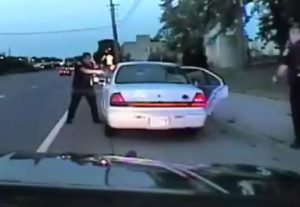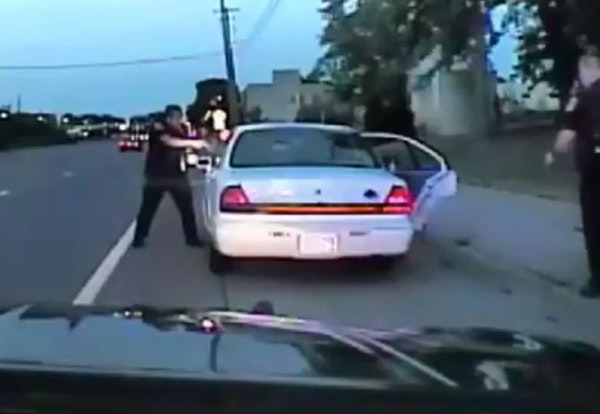This week, a Minnesota jury acquitted officer Jeronimo Yanez in the shooting death of motorist Philando Castile. This was a controversial police shooting that probably didn’t have to happen. I would encourage all of you to watch the recently released dash cam footage of the shooting if you have not done so. Watch the whole incident. It’s tragic.
My take on the shooting is that both the officer and the motorist made some mistakes. Having researched the case, I don’t believe that Philando Castile was actually reaching for his concealed carry pistol. He did, however, tell the officer he was armed and make a hand movement consistent with drawing a concealed firearm. Those of you with CCW permits should know to be extra careful and avoid making any motions that a poorly-trained officer could construe as being threatening. Mr. Castile failed to exercise this type of caution and was shot by the cop as a result. He made a mistake, but in my mind that mistake should not carry a death penalty as the consequence.
The bigger mistake, in my opinion, was made by Officer Yanez. He appeared to panic when confronted by the fact that the driver he stopped was armed and didn’t seem to be paying proper attention to his verbal commands. He probably didn’t need to shoot Mr. Castile, but I feel reasonably certain that the officer felt that he had no other option. That is the predictable result of poor training, possibly combined with poor hiring practices on the part of Officer Yanez’ agency. People prone to panic should not be hired as cops. All cops should be given quality force on force training so that they know how to handle incidents like this without reflexively firing their weapons in abject fear. Unfortunately, both problems are likely to persist in the face of ever-shrinking government budgets.
What can you and I do to prevent innocent folks from being killed by poorly trained cops? It’s a difficult problem to solve. I have a couple words of advice for my readers who are CCW carriers and even more advice for my cop readers to follow.
First, if you are lawfully armed and encounter a cop, you should follow your state’s laws with regards to notification. Some states require that you notify the cop you are carrying and some don’t. Make sure you state your notification calmly. In all honesty, Mr. Castile’s notification to Officer Yanez was virtually textbook.
When you make this notification, your hands should be visible on the steering wheel and you should not be moving at all. Don’t try to get your wallet out or reach into your glove compartment for your insurance card. Remain perfectly still! Listen to what the officer tells you to do and obey his commands. If there is any doubt at all what the cop wants you to do, simply freeze. Don’t move at all until you are sure what the cop wants you to do. Always err on the side of remaining motionless rather than doing something when there is any doubt about the cop’s commands.
It’s sad, but it’s probably safest for the armed citizen to assume that the cop will be poorly trained and might get scared at your notification. Do everything possible to keep things calm and avoid making any potentially threatening motions or statements. There’s no guarantee that this will keep you safe, but it’s the best advice I can provide.
For my police readers, how would you like to be in Officer Yanez’ shoes right now? Clearly, he is better off than Mr. Castile because he is still alive, but his career and life are ruined. You don’t want to kill an innocent citizen. You also don’t want to go to jail, lose a lawsuit, or get fired. The onus is on YOU to prevent these things from happening. It isn’t your agency’s job to keep you alive, out of jail, and employed. Your agency will neglect to give you the training you need and fire you in a heartbeat when you screw anything up. It’s YOUR job to keep yourself out of the trick bag.
My cop readers need to focus on two issues:
1) Ensuring the validity of the initial transaction- The first thing that comes up in any police shooting investigation or any lawsuit filed against the cops is “Why did the cops contact the person they shot.” If the reason for the contact is bogus, then everything that transpires later is viewed with suspicion.
The media works this angle to the cop’s detriment. They blame the shooting on the reason for the stop, not what the suspect did afterwards. Right now we are hearing every media outlet talk about Mr. Castile being shot “for having a couple of burnt out brake lights.” That’s not why he was shot, but it doesn’t matter in the court of public opinion.
Your contact with any citizen in an enforcement capacity needs to be rock-solid. Not only rock-solid in a legal sense, but rock-solid in the court of public opinion.
Look at this shooting. The reason for contact (only one functioning brake light) is valid legally, but what do people think about cops pulling people over for minor infractions like that? They don’t like it. Following the logic, they will like it even less when someone gets shot as a result of a “bullshit” stop.
I know what the cop was doing, he was likely hunting for criminals and people who have warrants. I see it pretty regularly. Cops pull over crappy cars for equipment violations, hunting for an arrest. Poor people who can’t afford to fix busted tail lights often can’t afford to pay their tickets, their child support, or their court fees. Their driver’s licenses are frequently suspended and they regularly have warrants.
So, aggressive cop looking to arrest “bad guys” pulls over a beater car and runs everyone inside for warrants. About 25% of the time he gets lucky and gets an arrest or a bunch of tickets. Every once in awhile, bad shit happens, innocent people die and the cop ends up in the national media spotlight. Is it worth it to take the chance of such a negative outcome to enforce a relatively inconsequential traffic violation ?
The problem is that a large portion of society thinks that your hard work and “aggressive and proactive” policing style looks an awful lot like “screwing with poor people” instead of hunting criminals.
STOP HASSLING PEOPLE! The fact that some dude has a suspended license or hasn’t paid a speeding ticket is not negatively affecting the real safety of the community you patrol. I know you want to do good things and make lots of arrests, but every stop you make has the potential to go REALLY bad. Don’t stop people for bogus violations. Don’t hunt minor scofflaws. The public doesn’t respect you for doing so and occasionally you will get thrown under the bus when you screw something up, or your stop ends up in a shooting that you didn’t intend.
Put yourself in the position of Officer Yanez. Would you have made that traffic stop if you had known it would turn out like it did? My guess is the answer is “no“. Think about that the next time you feel like making a stop for a cracked windshield or some other trifling infraction.
I know this opinion will be criticized by hard working, aggressive police officers; and perhaps rightfully so. Most cops want to do a good job and lock up bad guys. A problem is created when the very public we serve does not approve of the manner in which we do this. The public’s disapproval of pretextual traffic stops and enforcement of petty traffic violations is at a historic high. They don’t like it. And they like it even less when you get involved in a controversial shooting because you finally caught one of those really bad guys that you were trying to put in jail.
In today’s world it becomes more a matter of individual and career survival than an issue of getting one more arrest. In my mind, that balance is pretty clear. I don’t make pretextual traffic stops. I don’t stop vehicles for minor equipment violations that don’t endanger the motoring public. I don’t run the plate on every car I see looking for the dude who has a suspended license because he didn’t pay his child support. Most of the people you catch by making these kind of stops aren’t truly criminals. They’re broke! Yes, they have likely made numerous poor decisions that have resulted in their warrants/suspensions, but most of these folks aren’t a real danger to your community. Don’t make it a habit to focus your attention on these “small fish.” Your community would probably prefer that you spend your time doing something more productive to enhance your residents’ safety.
My hard charging rookie self would have scoffed at this advice 20+ years ago when I was leading my police department in total numbers of arrests and traffic tickets. You cops reading this may scoff right now as well. Do what you think is best, but I promise that your perspective will change after a couple decades in the game. I want you to make it to your retirement healthy, happy, and outside the confines of a correctional institution. The best way to do that in today’s world is not by stopping every car that moves.
2) You need more and better training. I don’t know a single department in the country that gives its officers all the training they need. Initial recruit training in most states is abysmal. In Ohio, barbers get three times more training than cops do before being licensed. In-service training is even worse. I know some departments that provide NO in service training other than watching a couple videos each year.
If you are scared of legally armed citizens with CCW permits and you freak out because someone has a gun, you simply aren’t confident in your own abilities. That’s a huge problem. When you aren’t skilled and confident, you get scared and you over react. Freaked out cops don’t make good decisions. When cops don’t make good decisions, they end up on the national news.
Your department won’t give you the training you need. You have two options. You can seek out the training on your own or you can hope you never get into a bad spot where your lack of skills gets you killed or put in jail.
There has never been a greater variety of top notch weapon and martial arts training available for cops and private citizens. You need to start taking classes. You will be amazed at what you don’t know. I was already a state-certified police firearms instructor before I took my first professional shooting class. I learned more in that first day of professional gun training than I did in the two-week police “instructor” school.
If you haven’t done any training outside the academy or your agency’s in-service classes, quite honestly your skills are likely to be subpar. You don’t know what you are doing. You are prone to being killed or doing something stupid that will get you fired or jailed. Even worse, you may mistakenly kill an innocent citizen who makes a minor error of judgement in your presence.
Even though I’ve been teaching gun skills professionally for almost my entire career, I still take lots of outside training classes to keep my skills sharp. I make it my goal to seek out at least 80 hours a year of professional training over and above the training my agency provides. And I pay for those classes (and travel costs and ammo) out of my own pocket. I shoot my guns in practice at least weekly and pay for 5,000-10,000 rounds of practice ammo out of my own pocket every year. If you aren’t doing something similar, you are not ready to fight real bad guys on the street.
The same is true with police defensive tactics training. If your only training is from the academy, you don’t know how to fight. You owe it to yourself to get at least a year or two of quality training (at least two sessions a week) at an outside martial arts studio that focuses on a realistic fighting art. And it better be a fighting art where you regularly train against other people who are trying to punch, kick, or choke you. Doing fancy katas in your dojo’s mirror isn’t adequate. Look at wrestling, Judo, Jujitsu, boxing, Muay Thai, MMA, or Krav Maga.
It doesn’t have to be a lifetime passion. You just need to do the work necessary to beat most criminals. You’ll be amazed at how differently you look at situations on the street when you know how to fight. Your confidence will be a game changer and the criminals won’t even try you. If some guy high on marijuana doesn’t follow your commands instantaneously, you’ll have options other than shooting him.
OR, of course, you can ignore my advice, roll the dice and hope nothing bad happens. I wish you luck if you choose that route. It hasn’t worked out so well for some other folks lately.
If you’ve read this far, I thank you for your time. If you are a cop, I hope it prompts some positive change.
As always, the views I express here are the rambling thoughts of a single curmudgeonly police trainer. They do not reflect the views of my fellow officers, supervisors, or agency.



